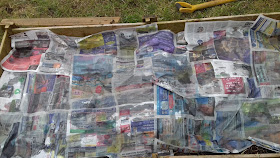If you were following along with me last year, you may be wondering how I got on with my homemade compost that I made for my upcycled bed bed. To recap, I was really pleased with how the raised bed turned out, but worried about how we would afford to fill it with compost. It's a huge bed. In the end I decided to try and make compost myself, in the bed - a cross between trenching, composting and making a lasagne bed. You can read all about how I did it in the link above.
I went out today to assess the state of the home made compost, and I wasn't expecting greatness, for several reasons.
1. I had pretty much neglected the entire thing since before Christmas. Hadn't dug it, hadn't turned it, hadn't really added anything to it. What can I say, I'm lazy.
2. I hadn't covered it over with any black plastic like I advised you to, because I didn't have any. It's not essential but it does speed the composting process up.
And
3. We hadn't had any very harsh weather this year. Hard frosts and snow areports both good for the land, they break down organic matter and clods of earth quickly. A mild winter here was great for my half hardy perennials, but not fantastic for the soil.
Once again my garden gave me a pleasant surprise. The soil looked messy at first but once I gave it all a good turning over it wasn't too bad at all.
As you can see some of the larger dead plants have yet to break down very well (I probably should've chopped them up smaller), and there is some persistent grass and a creeping cleaver or two in there, but overall the soil quality seemed quite good.
The level is a little lower than I'd have liked though, and I probably could've made it higher if I had continued to add layers of organic matter and newspaper through January and early February instead of just neglecting it. But again, lazy. So I decided to top it up today so the soil could warm up before my seedlings go in in a few weeks.
I put another layer of newspaper down on top of my new soil. It won't do much in terms of suppressing weeds (although it may help, who knows?) but it will break down and release more carbon into the soil.
And then gave the whole thing another good water.
I'm pleased with how it turned out. As the bits that haven't yet broken down rot down over the season, they'll release more nutrients into the soil to feed my plants. I plan on having some squashes, amongst other things, in that bed and they're heavy feeders too, so they'll like that, and I'll save money on expensive shop bought fertilisers.
I'm hoping to get that bed fully planted up over the next few weeks, with my squashes, some edible flowers, and maybe some beans and carrots.
I've just been gifted two wooden obelisks for the veg garden too, and I have to decide where they're going to go, and whether I'm going to grow beans or squashes up them. I wasn't planning anything quite as fancy as that, so it's thrown me into a bit of a tizzy!
Happy growing!




For black plastic to cover it next time- split open a bin bag maybe? Or use plastic carrier bags?
ReplyDelete